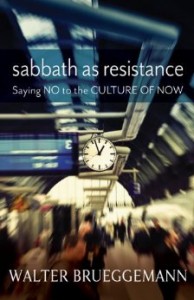I have just finished reading Walter Brueggemann’s new book Sabbath As Resistance. Talk about stimulating, challenging and encouraging. It is one of the best books I have read for a long time. He reminds us that Sabbath is not about keeping rules but rather about becoming a whole person in the midst of a restored, whole society.
Brueggemann contrasts the restless anxiety of our producer/consumer culture with the restfulness of God’s Sabbath world.
In our own contemporary context of the rat race of anxiety, the celebration of Sabbath is an act of both resistance and alternative. It is resistance because it is a visible insistence that our lives are not defined by the production and consumption of commodity goods. Such an act of resistance requires enormous intentionality and communal reinforcement amid the barrage of seductive pressures from the insatiable insistences of the market, with its intrusion into every part of our life from the family to the national budget….
But Sabbath is not only resistance it is alternative. It is an alternative to the demanding, chattering, pervasive presence of advertising and its great liturgical claim of professional sports that devour all our “rest time.” The alternative on offer is the awareness and practice of the claim that we are situated on the receiving end end of the gifts of God. (preface xiv)
Brueggemann explains that the command to keep Sabbath is the pivotal point of the ten commandments. The weekly work pause breaks the production cycle. It breaks the anxiety cycle and it invites us into a radical world of neighbourliness and equality. The commandments that follow he tells us really show us what neighbourliness looks like – you do not dishonour mother and father, you do not kill, commit adultery, steal, bear false witness or covet.
Sabbath is not simply a pause. It is an occasion for reimagining all of social life away from coercion and competition to compassionate solidarity. Such solidarity is imaginable and capable of performance only when the drivenness of of acquisitiveness is broken. Sabbath is not simply the pause that refreshes. It is the pause that transforms. Whereas Israelites are always tempted to acquisitiveness, Sabbath is an invitation to receptivity, an acknowledgement that what is needed is given and need not be seized. (45)
Grappling with the implications of Brueggemann’s theological interpretation is something that I am sure will occupy a lot of my mind in the next few weeks. I have long felt that God’s kingdom of wholeness and restfulness is the world view around which my whole life should revolve but I must confess it is not always so. Like the Israelites and like many of us, anxiety and acquisitiveness very quickly take over and in the midst of that anxiety the temptation to let go of Sabbath is huge.
I think that this is an essential read for all of us. And I hope that like me you will be challenged by this book to rethink your life and to learn to live in the Sabbath restfulness that God intends for us all.


4 comments
Great thoughts Christine! I just got this book a little while ago and am excited to read it! Thanks for your review on it. Really helpful.
Your welcome. I am thinking of adding to this post as I continue to sense insights from the book. A great one to read slowly, meditatively and restfully
My husband and I started intentionally taking a Sabbath day last year, and it absolutely transformed our lives. At first it was hard to set aside a whole day, but after a while it was the day we looked forward to most, and we became fiercely protective of it. We always started with a sleep in (if the kids allowed it!) and pancakes, so by mid morning we really felt we were in rest mode. We didn’t have any rules around the day beyond “only doing something if it will be restful and life-giving”. Sometimes we would end up weeding a garden because we wanted to, or going for a walk, but the whole day was dedicated to rest. We found ourselves more thankful for God’s blessings, and more aware of Him and each other with this day of stopping. Funny how we could be in the middle of leading others in church and ministries, and for so long ignore this basic spiritual practice in our own lives!
Thanks for this post Christine, sounds like a really great book.
Thanks Vanessa for your comments. I think that keeping Sabbath is transformative and it is a great book. Blessings on you